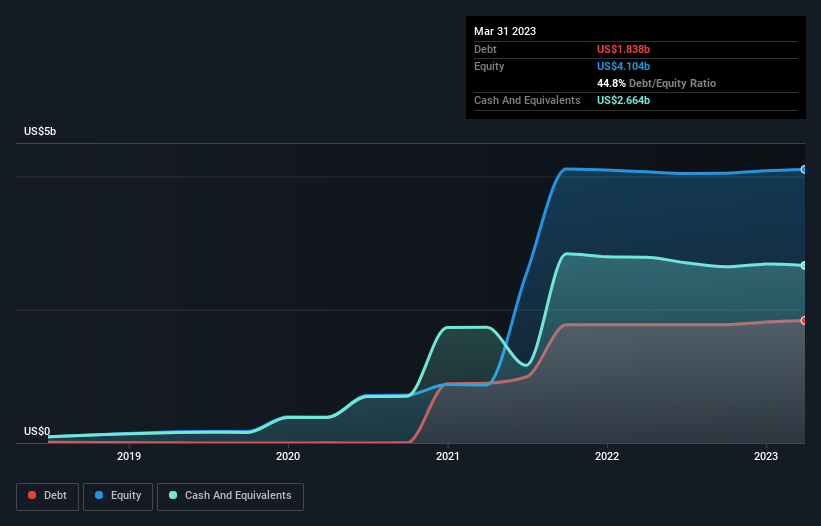- United States
- /
- Software
- /
- NYSE:BILL
BILL Holdings (NYSE:BILL) Has Debt But No Earnings; Should You Worry?

David Iben put it well when he said, 'Volatility is not a risk we care about. What we care about is avoiding the permanent loss of capital.' It's only natural to consider a company's balance sheet when you examine how risky it is, since debt is often involved when a business collapses. We can see that BILL Holdings, Inc. (NYSE:BILL) does use debt in its business. But should shareholders be worried about its use of debt?
What Risk Does Debt Bring?
Debt assists a business until the business has trouble paying it off, either with new capital or with free cash flow. If things get really bad, the lenders can take control of the business. However, a more common (but still painful) scenario is that it has to raise new equity capital at a low price, thus permanently diluting shareholders. Of course, the upside of debt is that it often represents cheap capital, especially when it replaces dilution in a company with the ability to reinvest at high rates of return. When we think about a company's use of debt, we first look at cash and debt together.
See our latest analysis for BILL Holdings
What Is BILL Holdings's Debt?
The chart below, which you can click on for greater detail, shows that BILL Holdings had US$1.84b in debt in March 2023; about the same as the year before. However, its balance sheet shows it holds US$2.66b in cash, so it actually has US$825.4m net cash.

How Healthy Is BILL Holdings' Balance Sheet?
Zooming in on the latest balance sheet data, we can see that BILL Holdings had liabilities of US$3.34b due within 12 months and liabilities of US$1.94b due beyond that. Offsetting these obligations, it had cash of US$2.66b as well as receivables valued at US$476.1m due within 12 months. So its liabilities total US$2.14b more than the combination of its cash and short-term receivables.
Of course, BILL Holdings has a titanic market capitalization of US$11.2b, so these liabilities are probably manageable. Having said that, it's clear that we should continue to monitor its balance sheet, lest it change for the worse. While it does have liabilities worth noting, BILL Holdings also has more cash than debt, so we're pretty confident it can manage its debt safely. When analysing debt levels, the balance sheet is the obvious place to start. But ultimately the future profitability of the business will decide if BILL Holdings can strengthen its balance sheet over time. So if you want to see what the professionals think, you might find this free report on analyst profit forecasts to be interesting.
In the last year BILL Holdings wasn't profitable at an EBIT level, but managed to grow its revenue by 85%, to US$963m. With any luck the company will be able to grow its way to profitability.
So How Risky Is BILL Holdings?
Although BILL Holdings had an earnings before interest and tax (EBIT) loss over the last twelve months, it generated positive free cash flow of US$69m. So taking that on face value, and considering the net cash situation, we don't think that the stock is too risky in the near term. The good news for BILL Holdings shareholders is that its revenue growth is strong, making it easier to raise capital if need be. But we still think it's somewhat risky. The balance sheet is clearly the area to focus on when you are analysing debt. But ultimately, every company can contain risks that exist outside of the balance sheet. Be aware that BILL Holdings is showing 1 warning sign in our investment analysis , you should know about...
If you're interested in investing in businesses that can grow profits without the burden of debt, then check out this free list of growing businesses that have net cash on the balance sheet.
Valuation is complex, but we're here to simplify it.
Discover if BILL Holdings might be undervalued or overvalued with our detailed analysis, featuring fair value estimates, potential risks, dividends, insider trades, and its financial condition.
Access Free AnalysisHave feedback on this article? Concerned about the content? Get in touch with us directly. Alternatively, email editorial-team (at) simplywallst.com.
This article by Simply Wall St is general in nature. We provide commentary based on historical data and analyst forecasts only using an unbiased methodology and our articles are not intended to be financial advice. It does not constitute a recommendation to buy or sell any stock, and does not take account of your objectives, or your financial situation. We aim to bring you long-term focused analysis driven by fundamental data. Note that our analysis may not factor in the latest price-sensitive company announcements or qualitative material. Simply Wall St has no position in any stocks mentioned.
About NYSE:BILL
BILL Holdings
Provides financial operations platform for small and midsize businesses worldwide.
Mediocre balance sheet low.
Similar Companies
Market Insights
Community Narratives



